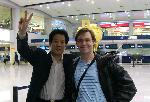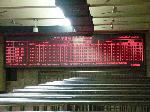- Getting around Lijiang. Dont stay in the Old Towns more than 2 days, there is nothing to do. KRISS Oct 9, 2013 05:46
- 2013 Beijing Temple Fair BENNYLAU Feb 26, 2013 03:29
- Malaysian traveling from KUL - LAX vis Shanghai PVG ZATI_DY Jan 3, 2013 20:15
When Best Laid Plans go Astray
- Views: 2349
- |Vote: 0 0
- |Add to Favorites
- |Recommend to Friends
One Nightmare in Beijing
I've travelled extensively in China, seen a lot of cities and met many different people - both locals and those who were, like myself, passing through. One person who has always stuck out in my memory is a young British boy who was aiming to travel around the world before his 20th birthday. His impression of China was particularly acute when he told me: "there's no other country in the world where you can ask directions when you're lost and end up being invited for dinner, asked to stay, guided around the city and treated like family without having done anything else to deserve it. In Western countries, you can be ignored when asking the way - here, you're always ok".
He was quite right - in China, people do go out of their way to help. At the same time, this is a habit that has a double edge - as I was to discover on my recent excursion to Hunan, my first bona-fide travel disaster.
I'd been invited to Hunan's provincial capital city - Changsha - to act as a guest judge on a popular TV talent show called "Who's the Hero?". I was delighted at the opportunity to return to a province I had enjoyed travelling around some time before, and thought the invitation a good excuse to see how Changsha has changed in recent years. However, on the evening I departed from my apartment in northwest Beijing, I was rather disturbed at the gathering of thick, yellowish clouds above - another sandstorm on its way. It was to prove an ill omen for my journey ahead.
For a start, traffic was intense in the capital. On the eve of the national week-long holiday for the observance of Labour Day, Beijing's ring roads had been reduced to a virtual parking lot, and the trip to the airport took almost two hours, leaving little time to spare.
I was greeted by the very enthusiastic Mr. Guo, ticket agent for the TV station. He was delighted to meet me and insisted on using his connections within the airport to check my bags through and issue my boarding pass without requiring any forms or identification on my part. This was exactly the kind of hospitality I've come to associate with China, and although I wasn't comfortable with my bags being rushed away from me, I was dizzy and ill after a long, bumpy taxi ride and wasn't in the mood to refuse. It wasn't until I got to the boarding gate that I realised that my passport was in one of the bags he'd been so enthusiastic in putting on the plane ahead of me.
It was a serious error. We rushed from counter to counter as the officials politely shrugged and directed us elsewhere. In impossibly logic-defying fashion, I was told that everything would be ok, that I could buy another ticket for the next day and that my bags would be posted back to me within a fortnight. Some earnest pleading encouraged one bright lad to cheerfully fetch my luggage from the belly of the plane, which promptly left without me.
The ticket agent apologised profusely, and we sat glumly weighing up alternatives. Fortunately, reasonable knowledge of Chinese geography presented an option: flying to the capital of the province just north of Hunan - Hubei - and from the railway station there purchase a ticket to Changsha. Within an expensive half an hour I was on a plane, headed for the wrong city.
One Nightmare in Wuhan
It was midnight by the time I arrived in Wuhan, and I was due to meet the TV executives in Hunan early the next morning. Trains were unlikely to have vacant seats, but I hoped that I could at least get a standing ticket for the four-hour journey to Changsha. I also needed to choose which railway station to check for tickets - Wuhan is the collective name for three separate cities - Hankou, Hanyang and Wuchang - each of which has its own railway station. I decided on Hankou - it was the closest to the airport, but the risk involved was that Hankou is the northernmost station and services to the south would be less frequent than those from Wuchang, on the southern side of the great Yangtze River that flows through the city.
Hankou Railway Station, at half-past midnight, was packed. Two ticket booths out of around 15 were open to serve lengthy queues, and annoyingly, officers kept changing booths, meaning that the queuing customers would have to madly rush to the next window and reform according to whose reactions were fastest - and mine were not. Furthermore, the bookings display was grimly discouraging, with ticket availability for each and every destination reading a bold, red Chinese character for 'none'.
When I finally reached the window I was told flatly that there were no tickets, not even in standing class, for Changsha until the next evening. I asked if I could by a platform ticket - usually purchased by non-passengers for the purposes of seeing off relatives and friends. The plan was to try to buy a ticket on the train - a common solution for this very problem - but the ticket agent told me it was hopeless. This was the holiday season - one of the three one-week periods when half the country takes to the trains to travel home or to go on a tour. These 'golden weeks' for the travel industry are 'panic weeks' for travellers, and good tickets are almost impossible to get.
I wandered out of the station and sat glumly on the forecourt, feeling particularly defeated. I thought to try the long-distance bus station, and casually asked a guard which way to go. Just as my British friend had said, the response was enthusiastically helpful and proved to change my luck.
"They told you there are no tickets, huh?", he said. "Where are you headed?"
"Changsha", I said unhappily.
"No tickets even to Changsha? Crazy. Why don't you go and ask the guards at the platform, maybe they can get you on a train."
I didn't quite believe him, but I shuffled across to the waiting area and meekly asked the guards if they could help me get to Changsha by morning.
"Oh... no tickets? You asked? Nothing? Ok, we'll get the night manager to write out a ticket for you.”
China's train ticketing system needs to change, I reflected as I lay sprawled across a few plastic chairs in the waiting hall after a series of guards and officials had very helpfully handwritten a standing ticket for a train leaving at the bone-chilling hour of 4.26 a.m. The computer system, using a program designed for Windows 3.1, is only capable of allocating seats to passengers for the entire duration of the journey, regardless of where they are getting on or off. My train for Changsha turned out to be quite uncrowded - I had found an empty seat within half an hour of getting aboard.
Unfortunately, with the frequent announcements at the station and the constant wandering of half-asleep hall attendants, I hadn't slept at all during the four-hour wait, and neither was I able to rest on board. At the very least, I was able to witness a perfect dawn on a trip through the pristine green fields of northern Hunan.
Who is the Hero?
I arrived in Changsha and before long had met with my hosts from Hunan TV. Sympathetic to my ordeal, they had booked a room for me at a local hotel - the comfortable and very well-priced Keyuan Hotel on Deya Road - so that I would be able to sleep for one hour. Thirty seconds after falling on the bed, I was as far away from Earth as a corpse, and when my room's phone sounded an hour later, I was very reluctant to come around. From within my dreamless sleep, I gathered what remained of my energy and prepared myself for the day's shoot.
"Who's the Hero" turned out to be a very popular talent show, where contestants from various disciplines of Kung-fu - ranging from stone-splitters to jugglers to fan-throwers - compete for the glory of being favoured on television. Being involved in the production was certainly to prove an interesting experience.
Getting cast as a novelty human being on Chinese TV shows has become ever more common for foreigners, and is starting to rival English teaching as a way to pay for travel abroad - I was one of five foreigners selected to judge the show, and we made up an international panel with one representative from each of the world's five continents. There was a second panel of local judges, bizarrely composed of one corporate executive from the show's sponsors, one female sex writer in an outrageously short mini skirt, and one Buddhist high monk.
We five foreigners were all expected to speak fluent Chinese on the broadcast. The prospect made all of us nervous, although we'd all spent at least some time studying Mandarin. Despite this, the show went relatively smoothly - I was even asked to cross over to the stage to sing a duet with a competing transvestite - and I was relieved by the end of the performance to have made relatively few shocking language errors. We'd recorded straight for six hours by that stage, and I was delivered back to the hotel nearing one o'clock.
One of my fellow foreign judges, a young Romanian girl with exceptional Mandarin, really wanted to do something in the city before she had to fly out the next morning. Even though it was late, I decided to take her for a walk and dinner at a local garage-restaurant of the cheap, messy kind that are open all over the province. We were both exhausted, but before long we were feasting on real, tasty, and cheap Hunanese cuisine and toasting the day with bottles of local beer. We sang favourite songs in Chinese and, despite all that had gone wrong on this particular adventure, I was grateful still for the chance to be in this country at all.
My episode of "Who's the Hero?" will be broadcast on Hunan TV on May 14th at 7.30pm - feel free to tune in if you want to see me and four other foreigners making a fool of ourselves...






 Copyright © 1998-2026 All rights reserved.
Copyright © 1998-2026 All rights reserved.